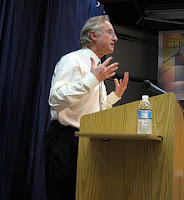 The slur du jour aimed at atheists appears to be that of "militant atheism." While we in the atheist community know full well that there is no such thing as a militant atheist, the Christians who use this phrase remain willfully ignorant or are simply so used to distorting reality that it no longer bothers them. Make no mistake - this is a form of anti-atheist bigotry and should be treated as such. Atheists need to have a plan for responding to the charge of militancy. To do so, we must understand the accusation, why we are seeing it, and what it reveals about those making it.
The slur du jour aimed at atheists appears to be that of "militant atheism." While we in the atheist community know full well that there is no such thing as a militant atheist, the Christians who use this phrase remain willfully ignorant or are simply so used to distorting reality that it no longer bothers them. Make no mistake - this is a form of anti-atheist bigotry and should be treated as such. Atheists need to have a plan for responding to the charge of militancy. To do so, we must understand the accusation, why we are seeing it, and what it reveals about those making it.Applications of the "Militant" Label
Richard Dawkins was greeted with accusations of "militant atheism" when he published The God Delusion
And now we have PZ Myers, widely accused of "militant atheism" for mocking Catholicism in the Crackergate incident. What exactly was Myers' offense? He criticized religion on his blog, encouraged others to do the same, spoke out against religion in various interviews, and destroyed a wafer obtained from a Communion ritual. This makes him militant? Really?
These may have been two of the most prominent examples, but there have been countless others accused of "militant atheism." The pattern which emerges is quite clear: a militant atheist is an atheist who does not keep his or her feelings about religion hidden. That is, you might be a militant atheist if you express yourself on the subject of religion. Exercising your freedom of speech makes you militant.
The Myth of Militant Atheism
In a previous post on the subject of militant atheism, I wrote,
Since atheism refers to the lack of theistic belief, militant atheism must be something like an aggressive or impassioned lack of theism. Confused yet? Yeah, me too. Once we understand what atheism is, it becomes evident that "militant atheism" is meaningless, at least in this context.In all other contexts in which the word "militant" is applied, it refers to behavior rather than one's viewpoint. Moreover, the "militant" descriptor is typically reserved for violent behavior. According to State of Protest, "Real militant atheism is literally taking up a weapon and fighting those who support religion, and in some cases those who merely don’t support real militant atheism." For example, when The Uncredible Hallq searched Google for "militant Christian" and "militant Muslim," he found that they were used to depict persons or groups committing acts of violence. Catholics issuing death threats to PZ Myers seems to fit the bill; criticizing religion does not.
So what is really going on when a Christian uses the "militant atheism" accusation? According to Russell Cole of the Midwest Populist Party,
Consequentially, the terminology, militant atheists, should be understood not as an expression that refers to the elements in society who possess the intellectual tenacity to hold to scrutiny the mythology that continues to dominant the worldviews possessed by the religious; the flocks of mindless followers. To the contrary, the unfortunate phrase is best understood as the projection upon the reasoned and rational, by those who lack such lucid deliberations, of the very shortcomings that impede the intellectual maturation of the faithful.Rather than acknowledging that those trying to improve society might have legitimate reasons to seeking change, it is easier for those in power to demonize them. We saw this with the Civil Rights movement of the 1960s, and we are seeing it now as atheists seek equality.
Future posts will explain how accusations of "militant atheism" are a form of anti-atheist bigotry and will explore how atheists should respond to such accusations. For now, I highly recommend this video. If you have written on these subjects, please feel free to leave links to your content in the comments.